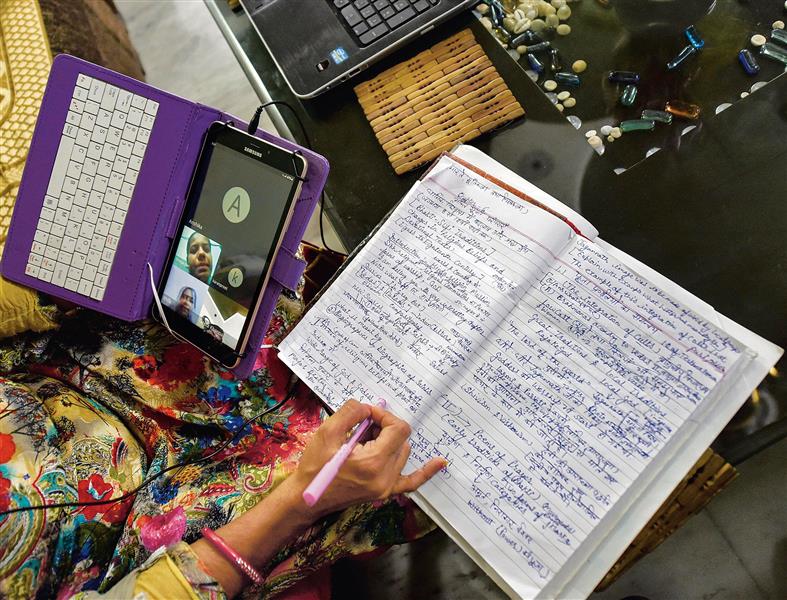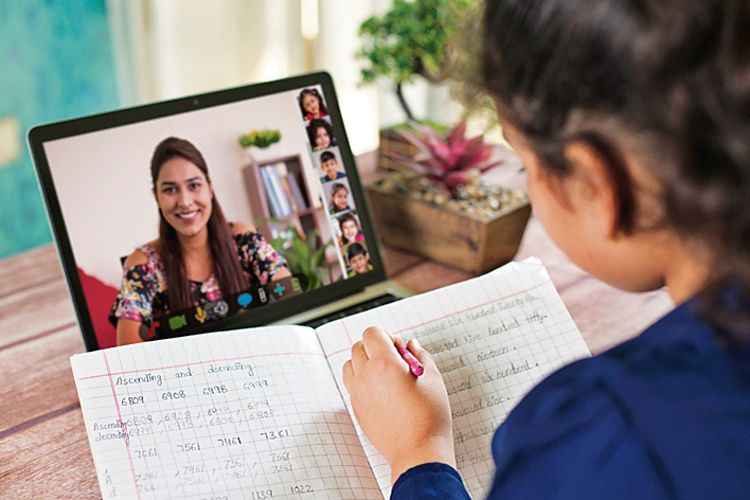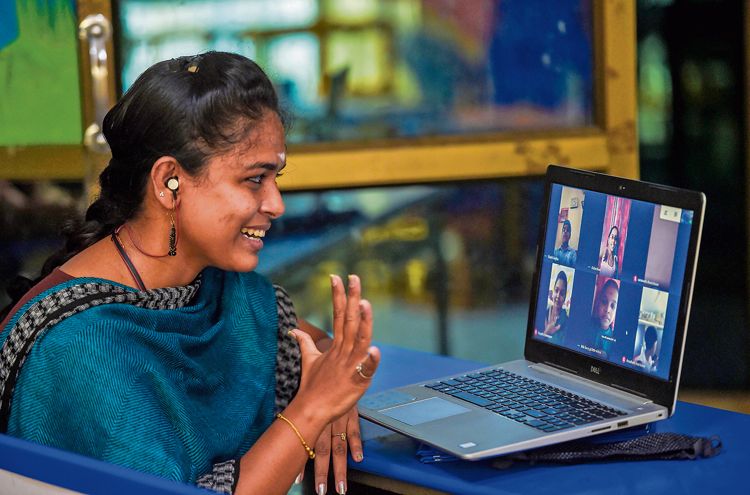
Seema Pathela Sachdeva
Pankaj Kumar Sharma hasn’t stopped beaming with joy since a science project on a low-cost air purifier by one of his students won the ‘Inspire’ award this year. The competition was conducted by the Department of Science and Technology, Government of India. This is no mean achievement for this science teacher at Government Middle School at Bhoewali, a village in Ajnala, Amritsar. While he’s happy that the award money of Rs10,000 has already reached the student’s bank account, the prize also meant recognition of his hard work and the efforts he made to remain connected with his students during the pandemic. Near the border, network connectivity remains erratic and with physical presence in schools not a possibility, he ensured that the creative lab material reached the students at their homes and guided them online. Unlike him, however, many teachers have not been able to get such a favourable response despite their best efforts.
 According to Kulwinder Singh, maths and science teacher at Government School, Mundi Chohlian, Shahkot, Punjab, “When the pandemic struck last year, initially only three to four students out of 44 started attending the online classes. Most of the students in rural areas didn’t have smartphones then. It did take a while for the children as well as parents to understand that online teaching was going to be the way forward.”
According to Kulwinder Singh, maths and science teacher at Government School, Mundi Chohlian, Shahkot, Punjab, “When the pandemic struck last year, initially only three to four students out of 44 started attending the online classes. Most of the students in rural areas didn’t have smartphones then. It did take a while for the children as well as parents to understand that online teaching was going to be the way forward.”
From calling them up to going door-to-door, he says the teachers tried to convince the parents that they should ensure that their children attend the classes regularly. “This helped a little but the numbers still were not very encouraging. Only 20 students had rejoined the virtual classes. This year, too, the figures don’t appear very encouraging,” he adds.
When Covid-19 struck, technology was the only option available for teachers to connect to students, confined to homes due to the lockdown. From familiarising themselves with virtual teaching methods such as using apps like Microsoft Classrooms, Google Meet, Zoom, besides engaging students on WhatsApp groups and recording videos and giving virtual lectures, it has been a unique learning experience for the educators. The chalk-and-talk teaching method they were used to had been replaced at short notice. Taking virtual classes, checking assignments online, besides keeping track of the students’ progress, was the new normal they had to get used to.
 Many teachers went beyond the call of duty in reaching out to students, with some even helping them in getting the resources needed for their studies. Some recorded their lectures for students who had missed out due to the non-availability of phones at home while their classes were being held. A few teachers even uploaded the lectures on YouTube. ‘Science in rural areas’is one such initiative in Punjab.
Many teachers went beyond the call of duty in reaching out to students, with some even helping them in getting the resources needed for their studies. Some recorded their lectures for students who had missed out due to the non-availability of phones at home while their classes were being held. A few teachers even uploaded the lectures on YouTube. ‘Science in rural areas’is one such initiative in Punjab.
Among the many challenges that teachers in the region faced was when many bright students from poor families discontinued school since they could not afford the smartphones or devices needed to attend online classes. Malika Raj, who teaches Classes XI and XII at Government Girls Senior Secondary School, Sultanpur, Kullu, says, “One of my students who had scored 92 per cent in her Class XII board exams and her fairly bright younger sister studying in Class X decided to drop out since their parents didn’t have the resources to buy them smartphones. Before the lockdown, the girls, whose house was on a hilltop, walked for two hours to reach school. When it closed due to the pandemic, they found it impossible to pursue further studies. Also, since no student from their classes lived near their house, they could not get access to what was being taught. We couldn’t let such bright futures go waste. It was only after some of us (teachers) pooled in money and bought them a smartphone that they started attending their virtual classes.”
Seema, a teacher at Jawahar Navodaya Vidyalaya, Una, however, feels that many students despite getting smartphones from the school seemed to have lost interest in studies. According to her, very few students are actually responsive in the class. Trying hard to balance her professional life with the personal hasn’t been easy for this teacher, who is the mother of an 11-year-old autistic child. “I’m at home, teaching the students online, but there’s hardly any time left for me to monitor my own child’s progress. I feel frustrated when I see that the gains we had made so far regarding his speech have been lost. The one positive that has come out is the immense teaching material available online,” she says.
Educators teaching practical subjects online faced another issue. Mala Chawla, who teaches Fine Arts to senior classes at Government Senior Secondary School, Amritsar, has been at her wit’s end whenteaching the creative subject in a virtual class. According to her, unlike other subjects which can be taught online, it is not feasible to teach such subjects without physical presence.
Shamita Sharma, a teacher at a private school in Kangra, says there are a number of hiccups they still face when teaching. “Since there is a major connectivity issue in most rural areas here, we record the lectures, which are then shared in parts with students on WhatsApp. These need to be recorded in complete silence. If there’s a dog barking in the background or a vendor selling wares in the street, the lecture needs to be rerecorded. This takes away a lot of time,” she says.
While the online system has helped students get 24x7 access to their teachers, it has its own problems, the major one being the shrinking quality time for onself. Complete access to a teacher’s phone all the time means that they keep getting calls at odd hours from students as well as parents. In some cases, parents start interfering in the class as well, at times to the extent of being rude to the teacher.
“When such situations arise, my teachers have been trained to ask the parents to speak directly to me,” says Rashmi Vij, principal, Police DAV School, Jalandhar, who describes virtual classes as a learning experience for both teachers as well as students. According to her, compared to last year, the teaching methodology has become much more streamlined and organised in keeping with the virtual mode. “There has been growing appreciation among the parents about the efforts teachers are putting in. They are also able to understand the importance of extracurricular activities,” she says.
Sandhya Kheterpal, a teacher at a private school in Rohtak, compares the experience of teaching online to a game of snakes and ladders. “I have been teaching for the past 14-15 years but when virtual classes started, we too were students, learning many new things. The wide range of online resource material has been an eye-opener. I have developed a special bond with my students and their parents.” The only thing she rues is that all this leaves very little time for her family. “I hardly get time to see how my two daughters are doing in their classes since our timings clash most of the time,” she says.
Online teaching has helped in creating a bond between the parents and teachers. Narrating an interesting incident, Malika recalls, “I had called up a mother to check a student’s progress when she started crying. The poor woman, who was a momos seller, mentioned that her child was always on the phone playing games, and the data pack would finish off soon. It took much effort to console and calm down the mother as well as counsel the child.”
For Raj Deep, who teaches senior classes at a private school in Chandigarh, the experience has been both good and bad, in equal parts. The good part is the control over the class and the bad part is the lack of control over the narrative. “We started with the students feeling more powerful because they were much more at ease with technology. Initially, there were many incidents of mischief-makers entering the virtual classroom (with complicity of the students) and disrupting the teaching process. That novelty soon wore off and we settled into an uneasy truce. The students demanded more attention, and got it. They demanded a more human approach in this mechanical process, and got that too. They rebelled, protested against uncaring attitudes from the teachers, and they won. Overall, it has been a wonderful experience.”
A teacher of a private school revealed that while she enjoyed teaching, sadly the teachers have not had a vacation since last November. “The children had their summer and winter breaks but the teachers had to organise online camps during the holidays. Although the camps were being organised by activity teachers, the presence of class teachers and educators too was mandatory,” she said, adding that they can’t say ‘no’ since their jobs are at stake. Too much onscreen time has also been responsible for many health issues such as dry eye and cervical pain, she adds.
A new session has already started, and with the pandemic refusing to halt its march, the standard operating procedures in virtual classrooms offer a ray of hope to students, parents as well as teachers. Nearly a complete year without physical classes is rewriting the rules of teaching. One thing is for sure, teaching will never be the same.
‘Parents satisfied’
It was initially difficult for teachers but they have risen to the occasion. Parents, too, are happy as we are training the children in activity classes to help in household chores like laying the kitchen table. —Rashmi Vij, Principal, Jalandhar
‘Hard work valued’
Teachers are under immense pressure. The good thing is that there has been a change in perception about government teachers. Parents understand the hard work and effort we put in. —Kulwinder Singh, Teacher, Shahkot
‘Exam uncertainty’
With Class XII exams getting postponed, students are losing interest in their studies. They hardly join the classes, though we try to counsel them to keep in touch with their studies. —Seema, Teacher, Una
‘Early & late classes’
In some families, the smartphone remains with the head of the family, who carries the phone when leaving the house. So, I schedule the classes mostly before 8 am and after 7.30 pm. —Pankaj Kumar Sharma, Teacher, Ajnala
‘No personal time’
There’s hardly any time for myself. Sometimes students call up even at 10 pm to understand a concept. While we do understand that they only have us to resolve their queries but it takes a toll on us. —Shamita Sharma, Teacher, Kangra
‘Impractical for us’
In a practical subject like fine arts, making a correction is not possible verbally. Even if there’s a ready painting, it becomes difficult for us to make a student understand where the flaws are. —Mala Chawla, Teacher, Amritsar
Join Whatsapp Channel of The Tribune for latest updates.



























